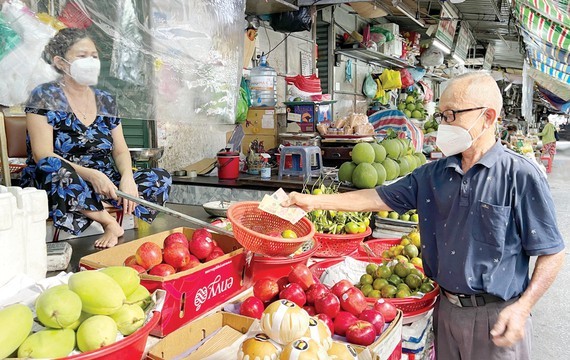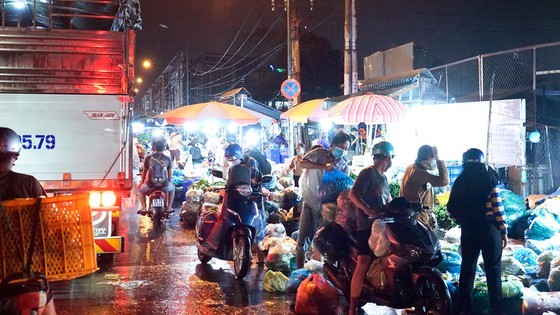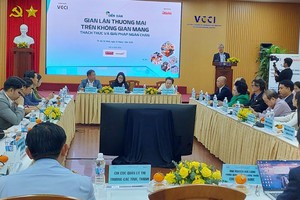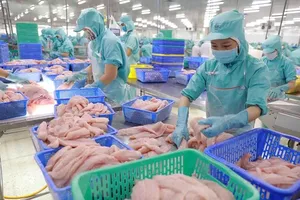 A customer buys fruits at Ba Chieu Market in Binh Thanh District on October 5. (Photo: SGGP)
A customer buys fruits at Ba Chieu Market in Binh Thanh District on October 5. (Photo: SGGP)
Small traders observe the situation
According to the Department of Industry and Trade of HCMC, 21 out of 237 traditional markets in the city have reopened by October 5. However, the number of stalls remains modest, less than 30 percent.
At Ben Thanh Market in District 1 and Ba Chieu Market in Binh Thanh District, the market management boards and small traders are still checking out the market and the pandemic situation, so only a few stalls selling dried food, vegetables, fruits, meat, and fish are open. For instance, there are more than 1,300 stalls at Ba Chieu Market, but the number of small traders registered to reopen is about 200. Ben Thanh Market has about 70 stalls engaged in business.
There are not many customers coming to the market. “I heard that Ben Thanh Market has reopened, so I go there to buy some fresh food for my family. These products are also available at a supermarket near my house. However, I do not want to queue and enter a closed space, so I go shopping at the market to be comfortable," Nguyen Thu Tam, a resident in District 4, shared about the reason she went to the market. Tam, as well as all customers, wears facemask and complies with regulations on disinfection before entering the market.
Previously, the People's Committee of HCMC and the Department of Industry and Trade had issued documents guiding and urging localities to draw up plans to reopen markets with the condition that they are responsible for ensuring safety and Covid-19 prevention. Currently, the economic departments of districts and Thu Duc city are rushing to finalize the most feasible plan according to the set of criteria and call on small traders to ensure registration conditions to soon bring traditional markets back to operation in the state of "new normal" from October 10.
Meanwhile, since the opening of transshipment points, wholesale markets have attracted about 50 percent of the total volume of 200 tons of goods per day delivered to these places. This is a remarkable figure if compared to the time before October 1, when there was a night with no sign of goods entering or leaving the markets. With the traditional markets in all districts and Thu Duc city being gradually reopened, small traders and the management board of wholesale markets expect to be able to increase the volume of goods soon.
Spontaneous markets mushroom
From 10 p.m. to midnight of October 5, trade activities around the area of Binh Dien Wholesale Market in District 8 were quite bustling. Although the city kept reminding people to strictly follow the 5K regulation and not be negligent over the Covid-19 pandemic, the atmosphere here was not different from the Tet market. Along Nguyen Van Linh Street, tens of large trucks and container trucks parked on the side of the road for more than one kilometer to unload goods, causing traffic congestion. As for Quan Trong Linh Street, trading activities were buzzing on the two sides of the road. Goods were transported by all kinds of vehicles, causing traffic jams. Stalls and garbage occupied nearly half of the street.
According to the Department of Industry and Trade of HCMC, 21 out of 237 traditional markets in the city have reopened by October 5. However, the number of stalls remains modest, less than 30 percent.
At Ben Thanh Market in District 1 and Ba Chieu Market in Binh Thanh District, the market management boards and small traders are still checking out the market and the pandemic situation, so only a few stalls selling dried food, vegetables, fruits, meat, and fish are open. For instance, there are more than 1,300 stalls at Ba Chieu Market, but the number of small traders registered to reopen is about 200. Ben Thanh Market has about 70 stalls engaged in business.
There are not many customers coming to the market. “I heard that Ben Thanh Market has reopened, so I go there to buy some fresh food for my family. These products are also available at a supermarket near my house. However, I do not want to queue and enter a closed space, so I go shopping at the market to be comfortable," Nguyen Thu Tam, a resident in District 4, shared about the reason she went to the market. Tam, as well as all customers, wears facemask and complies with regulations on disinfection before entering the market.
Previously, the People's Committee of HCMC and the Department of Industry and Trade had issued documents guiding and urging localities to draw up plans to reopen markets with the condition that they are responsible for ensuring safety and Covid-19 prevention. Currently, the economic departments of districts and Thu Duc city are rushing to finalize the most feasible plan according to the set of criteria and call on small traders to ensure registration conditions to soon bring traditional markets back to operation in the state of "new normal" from October 10.
Meanwhile, since the opening of transshipment points, wholesale markets have attracted about 50 percent of the total volume of 200 tons of goods per day delivered to these places. This is a remarkable figure if compared to the time before October 1, when there was a night with no sign of goods entering or leaving the markets. With the traditional markets in all districts and Thu Duc city being gradually reopened, small traders and the management board of wholesale markets expect to be able to increase the volume of goods soon.
Spontaneous markets mushroom
From 10 p.m. to midnight of October 5, trade activities around the area of Binh Dien Wholesale Market in District 8 were quite bustling. Although the city kept reminding people to strictly follow the 5K regulation and not be negligent over the Covid-19 pandemic, the atmosphere here was not different from the Tet market. Along Nguyen Van Linh Street, tens of large trucks and container trucks parked on the side of the road for more than one kilometer to unload goods, causing traffic congestion. As for Quan Trong Linh Street, trading activities were buzzing on the two sides of the road. Goods were transported by all kinds of vehicles, causing traffic jams. Stalls and garbage occupied nearly half of the street.
 Trade activities are bustling at spontaneous markets. (Photo: SGGP)
Trade activities are bustling at spontaneous markets. (Photo: SGGP)
Traditional markets have also been facing fierce competition with spontaneous groups that sell fresh food online and have not yet been allowed by the authorities. These groups were established when the city was implementing strict social distancing and now have some patrons. Goods traded by these groups are neither subject to tax nor strict regulations on pandemic prevention and control, so their prices are lower than the market price, even 20-30 percent cheaper than supermarkets, depending on the type. Noticeably, near the Binh Dien and Ben Luc residential areas, spontaneous markets are crowded. People who accidentally turn into Binh Dien Residential Area have to struggle for about 30 minutes to get out because trucks and containers load and unload goods at intersections, causing traffic congestion. “From the beginning of October to now, all kinds of vehicles load and unload goods here every night. Not to mention that we cannot sleep because of the noise, the most worrying thing is that the pandemic might recur because many people gather at the spontaneous market," Hoang, a resident in Binh Dien Residential Area, said worriedly. Nearby, many parking lots, such as Tan Ky which is larger than a hectare, are also "requisitioned" to serve as points of sale by traders, instead of having to go inside the Binh Dien Wholesale Market. Around Hoc Mon Wholesale Market, bustling trade activities also took place on most streets, such as Nguyen Thi Soc, Le Thi Ha, National Highway 22, and internal roads. Here, besides trucks and containers parked along both sides of the road to unload goods onto small trucks and cargo tricycles, most of the houses with large street fronts were used for displaying goods for sale. “They trade blatantly day and night, with the volume of goods in each house much higher than the stall inside the market. So now traders in the market have gradually withdrawn," said a guard of the Hoc Mon Wholesale Market. According to a survey of wholesale markets, the volume of goods traded at the above-mentioned spontaneous markets is about 1,000 tons of all kinds per night. A representative of Thu Duc Wholesale Market said that small traders were very upset when they saw traders selling goods outside the market, such as along both sides of the National Highway 1, parking lots, Ngo Chi Quoc Street, and Provincial Road 43, even though the market was planning to increase the volume of goods to the market. Similarly, a representative of Binh Dien Market Management Company also informed that the market was expected to be put into operation with about 30 percent of capacity by the end of October, equivalent to attracting about 600 traders. However, the easy and cost-free rampant trade outside may discourage traders from registering to enter the market. "What we worried most is that pandemic prevention is not controlled well for trade activities outside the market, so it will greatly affect the market if there are cases of Covid-19 in the area outside the market," said a representative of the Binh Dien Market Management Company. The representatives of wholesale market management companies expressed their wish that the authorities would step in more drastically to completely handle spontaneous markets. Particularly, they would focus on inspecting, controlling, and strictly punishing cases of unlicensed business, traffic obstruction, especially not ensuring pandemic prevention. Moreover, they also suggested the authorities considering loosening some regulations to create favorable conditions for small traders in traditional markets to purchase goods.
People's Committees of wards and communes responsible for handling spontaneous markets
The People's Committee of Ho Chi Minh City has just issued an urgent document on strengthening solutions to manage the transportation and spontaneous trading of agricultural and food products in the areas around three wholesale markets. The municipal People's Committee directed the People's Committees of Thu Duc City, District 8, and Hoc Mon District to urgently inspect and completely handle the situation of spontaneous markets encroaching the roadside and failing to meet regulations on Covid-19 prevention. Moreover, they should not allow this situation to happen again in the areas around three wholesale markets. At the same time, districts must coordinate with the HCMC Police and relevant units to arrange forces to regularly inspect and control the area, research, install traffic surveillance cameras, and monitor for handling.
If spontaneous markets continue to take place around three wholesale markets, the chairman of the People's Committee of the ward and commune is directly responsible, and the chairman of the People's Committee of the district is responsible for explaining to the HCMC People's Committee. The People's Committee of HCMC also assigned the HCMC Police to direct the local police to arrange patrol officers to control and handle violations, especially the act of mass gathering, not complying with regulations on Covid-19 prevention, and roadside encroachment.
The People's Committee of Ho Chi Minh City has just issued an urgent document on strengthening solutions to manage the transportation and spontaneous trading of agricultural and food products in the areas around three wholesale markets. The municipal People's Committee directed the People's Committees of Thu Duc City, District 8, and Hoc Mon District to urgently inspect and completely handle the situation of spontaneous markets encroaching the roadside and failing to meet regulations on Covid-19 prevention. Moreover, they should not allow this situation to happen again in the areas around three wholesale markets. At the same time, districts must coordinate with the HCMC Police and relevant units to arrange forces to regularly inspect and control the area, research, install traffic surveillance cameras, and monitor for handling.
If spontaneous markets continue to take place around three wholesale markets, the chairman of the People's Committee of the ward and commune is directly responsible, and the chairman of the People's Committee of the district is responsible for explaining to the HCMC People's Committee. The People's Committee of HCMC also assigned the HCMC Police to direct the local police to arrange patrol officers to control and handle violations, especially the act of mass gathering, not complying with regulations on Covid-19 prevention, and roadside encroachment.
























